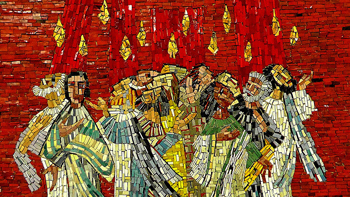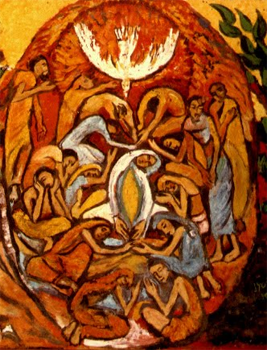For Sunday January 16, 2022
Lectionary Readings (Revised Common Lectionary, Year C)
Isaiah 62:1-5
Psalm 36:5-10
1 Corinthians 12:1-11
John 2:1-11
NOTE: This essay focuses on the reading from 1st Corinthians. For a reflection on this week’s Gospel reading, see “They Have No Wine” from the JwJ archives.
I love Pixar movies. When my children were younger, we watched them often, and to this day, The Incredibles is one of our favorites. Set in a fictitious version of the 1960s, the animated movie follows the members of a superhero family (Mr. Incredible, Elastigirl, and their three children), who are forced to hide their superpowers in accordance with a government mandate, and live quiet, “ordinary” lives in suburban America.
In one of the film’s telling scenes, the middle child in the family — a little boy named Dash — bemoans the fact that he has to hide his superpower (lightning speed) when he goes to school. “I thought our powers made us special,” he complains to his mother. “Everyone’s special,” his mom replies, hoping to placate him. But Dash rolls his eyes at her democratization of specialness. “That’s just another way of saying no one is,” he mutters.
I remembered Dash’s frustration this week, as I reflected on our reading from Paul’s first letter to the Corinthians. In it, Paul responds to an embattled congregation whose thorny questions echo Dash’s. What does it mean to be special to God? Who counts as “gifted” — and why? Aren’t some spiritual gifts and abilities more remarkable than others? How can everyone be special at the same time?
As a whole, Paul’s letter to the church in Corinth is an impassioned plea for unity. The church is fraying at the seams, unable to handle — much less celebrate — its rich diversity. In the section of the letter our lectionary offers us this week, Paul confronts one of the problems dividing the community: the problem of spiritual elitism. Which is to say, the problem of specialness.
 |
Paul notices that the church assumes an implicit hierarchy when it comes to gifts. Congregants with flashier, louder, more “ecstatic” abilities (ie, the ability to speak in tongues) consider themselves superior to those whose gifts are quieter, less visible, or more mundane. These self-described spiritual “superheroes” believe that their gifts are a sign of God’s special favor. A sign that they deserve more authority, status, and power in the church than those who don’t speak in tongues, perform miracles, or utter prophecies.
At first glance, this toxic first-century mess in Corinth might seem irrelevant to us. After all, most of us don’t spend our Sunday mornings fighting over the gift of tongues. But consider for a moment our own fraught relationship with giftedness. Don’t we have hierarchies of our own when it comes to the talents and abilities we admire most? In what ways do we equate giftedness with divine favor or blessing? Don’t we secretly believe that some Christians (the ones who preach, or pray eloquent prayers, or have the strongest leadership skills, or exhibit the most charisma) have a more direct line to God than the people who wipe down pews, run church nurseries, or order office supplies? Who in your church receives all the invitations and nominations? Whose gifts lie buried — unnoticed and uncultivated?
The fact is, we live in cultures and communities that encourage us to envy, worship, or become religious superheroes. We learn early on to hoard, compete, compare, and judge. We learn to think of “giftedness” as something we deserve — something we inherit at birth, or earn by sheer effort. In many of our contemporary contexts, the end goal of giftedness is privilege, status, and adoration. To be gifted is to be set apart, elevated far above the ordinary. Our gifts are for our own edification, pleasure, gain, and reward.
But this way of thinking about spiritual gifts has no place in Christianity. As our lectionary reading makes clear, spiritual superiority is — to put it bluntly — not a thing. In the case of the Corinthian church, Paul sees the dangers of religious snobbery, and he does everything he can to nip it in the bud. Specifically, he responds to the church’s spiritual one-upmanship with four powerful arguments:
 |
First, the source of all gifts is God. When it comes to our spiritual abilities, it’s God all the way down. The same spirit, the same Lord, the same God, Paul writes, grants and activates every gift we might lay claim to. Lest we forget, a gift (by definition) is freely given. It is not earned. It is not deserved. It is not meant to inspire competition, envy, or pride. The spiritual gifts we enjoy are treasures of a vast and generous grace, lavishly given by God at God’s discretion.
Second, everyone is special. This democratic notion might inspire a Dash-like eye-roll, but it is true. In fact, it is profoundly true. Left to ourselves, Paul argues, we can’t even get started as Christians. We can’t even make authentic confessions of faith. “No one can say, ‘Jesus is Lord,’ except by the Holy Spirit,” he writes. Meaning: the very fact that we can trust in Jesus, recognize him as Lord, or aspire to follow him at all, is a gift. It is a sign that God’s Spirit dwells richly within us. Can we take this in for a moment? Piety is not an accomplishment. Faith is not something we conjure out of blood, sweat, and tears. It’s not that we impress God with our stellar faith and thereby earn more magnificent gifts. It is that faith itself — the very possibility of it — is the magnificent gift. The sure sign of our belovedness.
Third, the gifts are not “for” us. Paul tells the church in Corinth that every gift and manifestation of the Holy Spirit exists “for the common good.” My ability to teach, preach, serve, love, pray, sing, hope, trust, write, nurture, or heal is not given to me for my personal delectation. It is given solely for the common edification, growth, and blessing of the church. To hoard a spiritual gift is to desecrate it. To practice a Lone Ranger Christianity is to fundamentally misunderstand and distort the purpose of God’s generosity. I receive for the sake of others. Which is to say, God apportions spiritual gifts based on the needs of the community as a whole — not on my “personal” needs. My gifts carry you, and your gifts carry me. It is God’s intention that we rely on each other. That we need each other. If we take this communal responsibility seriously, and share what we’ve been given, we might find deep relief and release in our lives of faith. We don’t have to do everything and be everything all by ourselves. I can lean on your wisdom. You can press into my faith. We can serve each other. No single person has to have every gift, because the ultimate recipient of God’s generosity is the church, not the individual believer.
 |
And lastly, diversity is God’s intention. The list of spiritual gifts Paul enumerates in his letter is by no means exhaustive. It merely illustrates the variety, plurality, and multiplicity of God’s own being. Which makes sense, of course. How can the vastness of our triune God exist in one spiritual gift or ability? How can God the Logos, the Creator, the Judge, the Shepherd, the Servant, the Lamb, the Counselor, the Bread, the Way, the Truth, and the Life manifest God’s multifaceted self in a single spiritual ability? Diversity is at the heart of who God is, and so diversity is the right and natural trademark of God’s church. Or at least, it should be. We are not meant to be cookie-cutter Christians. Our goal is not uniformity; it is unity across difference. The fact that our gifts are varied is not an accident; it is a reflection of God’s own nature.
To say that “everyone is special” in the eyes of our Creator is not to say that no one is. It is to tell the truth about our belovedness. It is to free ourselves of the burdens we carry and impose so cruelly on each other. The envy. The one-upmanship. The spiritual stinginess. The loneliness. It is to reject our culture’s worship of self-reliance, and lean hard into the fact that we belong to each other.
There are many gifts, and one Spirit. May we bind ourselves to this beautiful and essential truth, and find new ways to seek the common good together.
Debie Thomas: debie.thomas1@gmail.com
Image credits: (1) Pulpit Fiction; (2) From the Abbey; and (3) Global Christian Worship.





